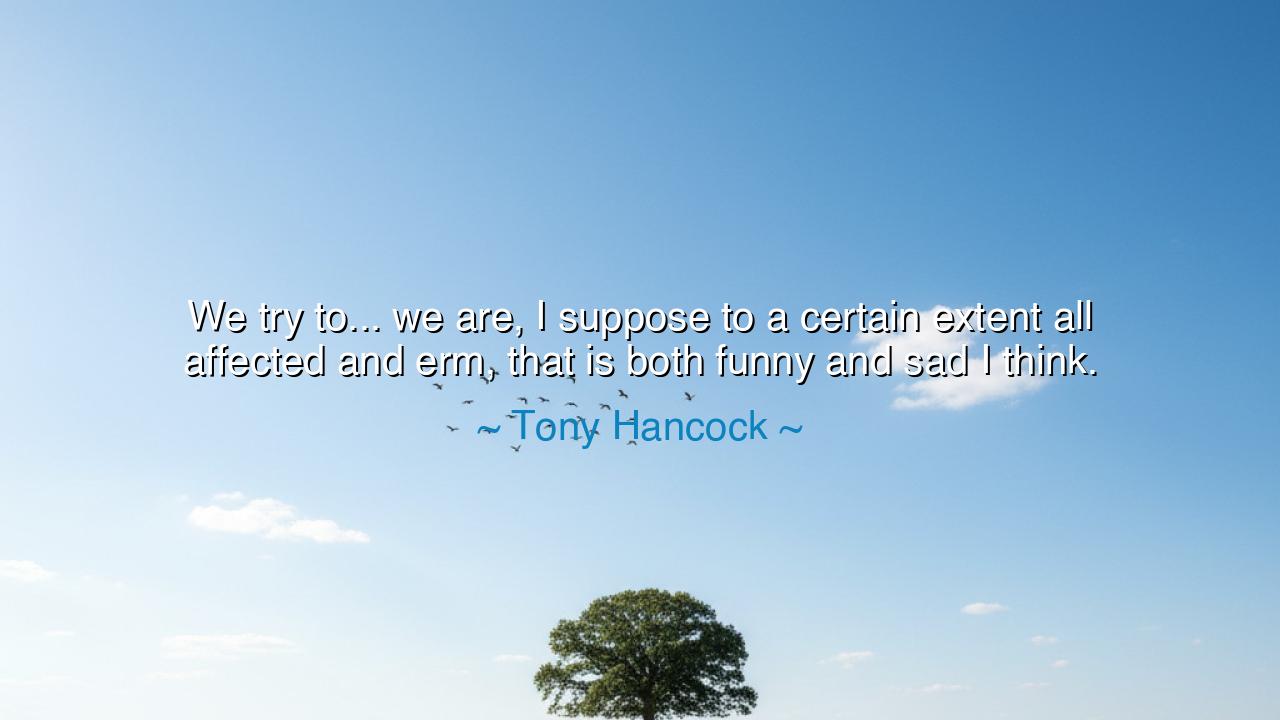
We try to... we are, I suppose to a certain extent all affected
We try to... we are, I suppose to a certain extent all affected and erm, that is both funny and sad I think.






Hear the quiet, thoughtful words of Tony Hancock, a man whose laughter carried sorrow beneath its veil: “We try to… we are, I suppose to a certain extent all affected and erm, that is both funny and sad I think.” In this utterance lies a paradox of the human condition—that we are shaped not only by joy and triumph, but also by weakness, by longing, by the masks we wear before the world. It is both humorous and tragic, this endless play of appearances and emotions, for in trying to seem one thing, we reveal the very fragility of our nature.
The meaning here is deep and layered. To be affected is to put on a posture, to assume a mask, to act in ways that are not wholly natural but shaped by how we wish to be seen. All people do this, Hancock confesses—some knowingly, some unconsciously. And in this common tendency there is irony. It is funny, for it shows how absurdly we labor to maintain pretenses; yet it is also sad, for it reveals how rarely we feel safe enough to live as our true selves. Thus, his words stand as both satire and lament.
The ancients too saw this. In the theaters of Greece, actors donned masks to portray gods and heroes, fools and tyrants. The mask itself was called persona—and from it we derive the very word “person.” How telling it is, that the identity we project is rooted in the idea of a mask! Like Hancock’s observation, this reveals that humanity has always been, to a degree, affected, caught between the truth of what we are and the appearance of what we wish to show.
Think upon the story of Marcus Brutus, who stood beside Julius Caesar as a friend while secretly conspiring in his death. To the world he seemed loyal; inwardly he was torn by doubt and ambition. When the deed was done, Rome wept not only for Caesar but for Brutus himself, whose duplicity was both funny in its irony and sad in its tragedy. His life shows us the very tension Hancock described: the human compulsion to act in ways that both reveal and betray our nature.
Hancock himself was a comedian—a bringer of laughter to millions—yet beneath the mask of mirth lay a heart often shadowed by melancholy. This gives his words greater weight. He knew personally how people are affected, how they wear roles for survival, for acceptance, for love. And he knew how both funny and sad it is that we must do so. His observation is not distant philosophy, but the lived truth of an artist who saw the double face of humanity: one smiling outward, one trembling within.
The lesson, O seeker, is that we must recognize both sides of this truth. Do not scorn yourself for being affected, for all humanity shares this condition. But do not surrender wholly to it, either. Strive, when possible, to live authentically, to let your face and your soul speak the same truth. For while there is humor in our pretenses, there is sorrow when we lose ourselves in them.
Practical is this counsel: reflect often on the masks you wear. Ask yourself, “Do I act this way for truth, or only for approval?” Remove the masks where you can, and in their place cultivate sincerity. Laugh at the absurdity of your own affectations, but also weep for the parts of yourself that long to be free. In this balance, you will find wisdom—not denying the comedy of life, nor shrinking from its tragedy, but holding them together as Hancock did, and seeing in both the tender mystery of what it means to be human.
Thus, Tony Hancock’s words remain a mirror for all generations: “We are all affected… and that is both funny and sad.” They remind us that the human condition is always double-edged—at once a jest and a lament, a mask and a truth. Let us then live with compassion, both for ourselves and for others, knowing that behind every smile may lie a shadow, and that in every shadow there may yet be light.






AAdministratorAdministrator
Welcome, honored guests. Please leave a comment, we will respond soon